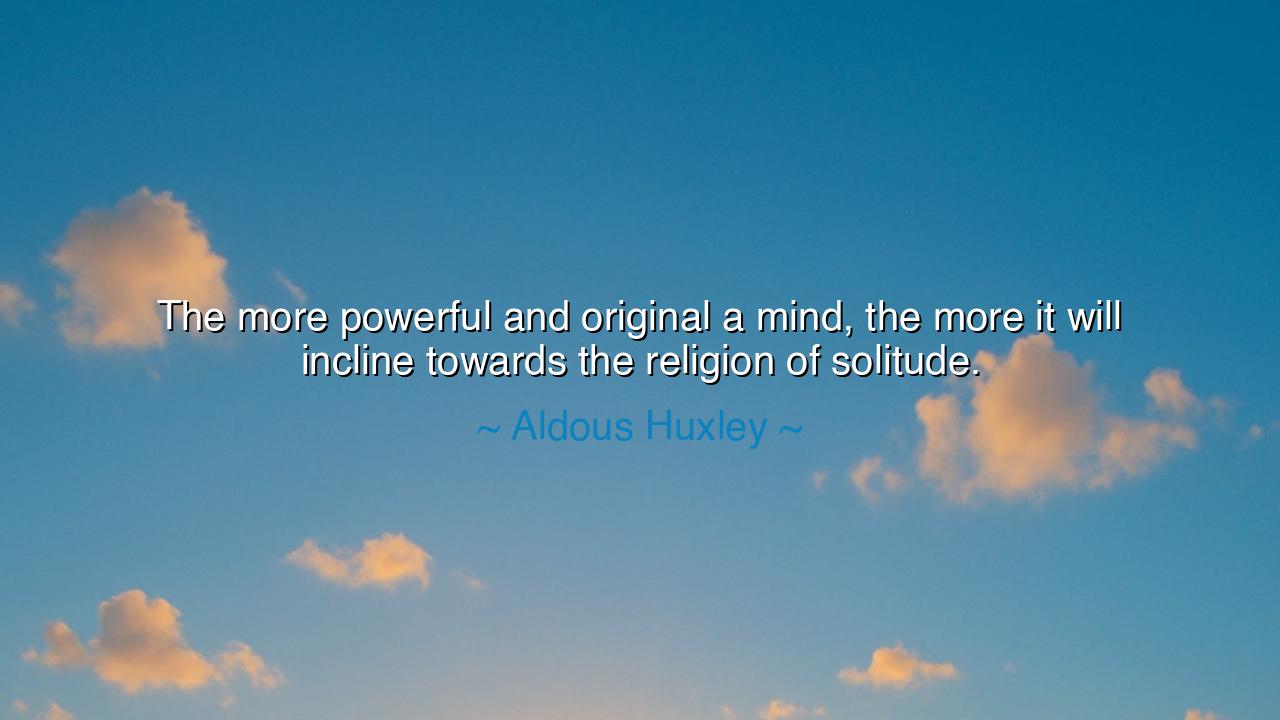
The more powerful and original a mind, the more it will incline
The more powerful and original a mind, the more it will incline towards the religion of solitude.






The great thinker Aldous Huxley once wrote, “The more powerful and original a mind, the more it will incline towards the religion of solitude.” In this profound observation lies a truth that echoes through the ages — that solitude is the sanctuary of the awakened soul. Huxley, who explored both the outer world of science and the inner world of spirit, understood that true creativity, wisdom, and power do not grow in the noise of the crowd, but in the silence of the self. For solitude is not loneliness; it is the sacred temple where the mind communes with its highest nature.
To understand his words, one must first see solitude not as exile, but as revelation. The ordinary mind, restless and easily swayed by others, seeks constant company and approval. It draws comfort from conformity. But the original mind, born with fire and vision, cannot find nourishment in the shallow waters of the everyday. It must retreat into silence — not to escape the world, but to see it clearly. In solitude, the mind hears the faint whisper of truth that is drowned out by the clamor of voices. It is there, in the quiet vastness, that the soul remembers who it truly is.
Huxley’s insight was not born from abstraction, but from the long lineage of ancient seekers who discovered that greatness and solitude walk hand in hand. The prophets retreated into the desert; the sages withdrew into mountains; the philosophers sought the stillness of the night. Lao Tzu left the court of men to write his eternal Tao Te Ching in the wilderness. Buddha, beneath the Bodhi tree, found enlightenment not in the marketplace, but in the solitude of his own being. Even Jesus, before beginning his ministry, fasted alone for forty days. These were not acts of isolation, but of communion — communion with the infinite, the eternal, the divine that dwells within all.
And history offers more recent echoes of this truth. Consider Isaac Newton, who during the Great Plague retreated to his family’s farm in Woolsthorpe. There, in isolation, he discovered the laws of motion, gravity, and light — truths that reshaped the world. The solitude that others feared became his laboratory of thought. Or think of Emily Dickinson, who rarely left her home, yet her inner world blossomed into poetry that still illuminates hearts centuries later. Such souls were not fleeing humanity; they were seeking its essence. For the deeper one’s mind, the greater one’s need for silence, lest the noise of the world extinguish the flame of insight.
Huxley’s phrase, “the religion of solitude,” carries a sacred resonance. Religion, in its purest sense, is a binding — a re-connection of the mortal to the eternal. Solitude, then, becomes a kind of worship, where the mind kneels not before idols or doctrines, but before truth itself. The powerful and original mind worships through contemplation, through reflection, through the still labor of thought. In such solitude, there are no intermediaries, no distractions — only the direct encounter between the self and the infinite. This is why Huxley called it a religion — for solitude demands reverence, devotion, and courage.
Yet this path is not easy. The weak mind fears silence, for






AAdministratorAdministrator
Welcome, honored guests. Please leave a comment, we will respond soon